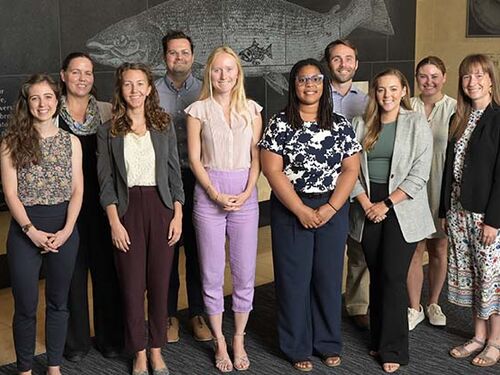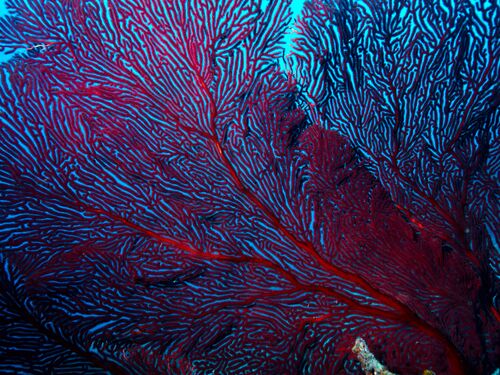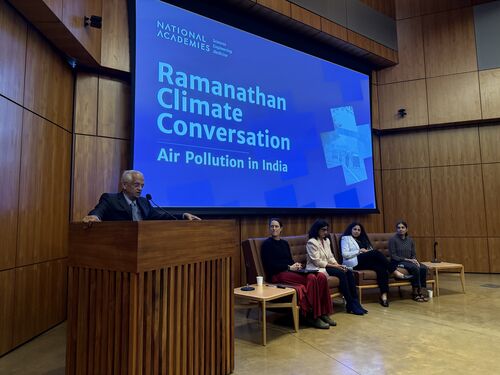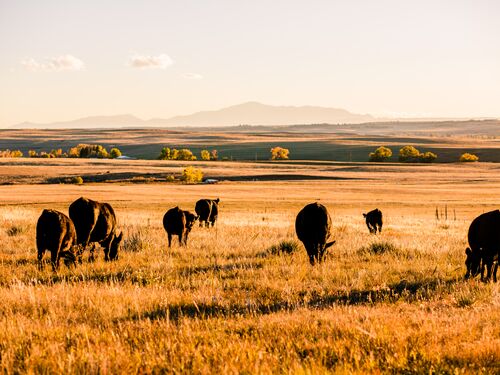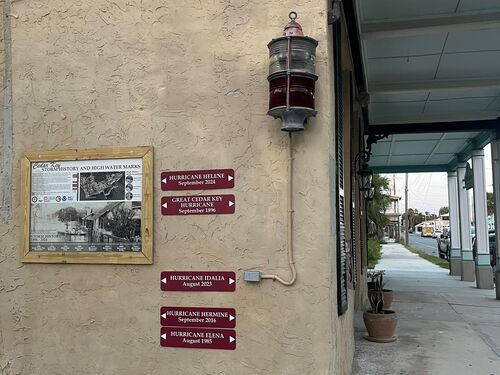National Academies’ Gulf Research Program Announces 2023 Cohort of 10 Science Policy Fellows
Program News
By Pete Nelson
Last update September 1, 2023
WASHINGTON — The Gulf Research Program (GRP) of the National Academies of Sciences, Engineering, and Medicine today announced the 10 recipients of its 2023 Science Policy Fellowships. Beginning Sept. 1, 2023, the fellows will spend one year on the staff of federal and state government agencies, public health departments, and nonprofit organizations across the Gulf of Mexico region.
The GRP’s Science Policy Fellowship helps scientists hone and direct their research skills to policy-related issues for the benefit of Gulf Coast communities and ecosystems. Under the guidance of a mentor at their host institution, fellows delve into activities such as policy development, evaluation, restoration planning, grants management, and stakeholder outreach while learning what it takes to apply scientific information to policy.
“The Science Policy Fellowship pairs talented scientists with organizations across the Gulf of Mexico region working to solve complex local challenges,” said Karena Mary Mothershed, senior program manager for the GRP’s Board on Gulf Education and Engagement. “These partnerships support emerging scientific leaders as they advance evidence-based policy for the benefit of Gulf Coast communities.”
Now in its ninth year, the fellowship program has a network of over 60 alumni. Alumni of the fellowship program have gone on to pursue promising careers at federal, state, and local government agencies, at nonprofit organizations, and as tenure-track professors.
This year’s cohort of Science Policy Fellows are:
Elijah Hall
Hall is a Ph.D. candidate studying ecology at the University of California, Riverside. He received his B.S. in biology from Juniata College in Huntingdon, Pennsylvania. Hall’s Ph.D. research has examined the impacts of climate change on plant-pollinator interactions in dryland ecosystems of the southwestern United States. During graduate school, Hall has been strongly involved in science policy, advocating for pollinator conservation on farms and researching health care equity across California. He hopes to continue using the best available data to help make informed policy decisions that improve environmental and community resilience in a changing world.
Elizabeth Harris
Harris received her B.S. in biology with a marine and organismal concentration from Spring Hill College in Mobile, Alabama, in 2020. During her time in Mobile, Harris spent a summer undertaking field-based coursework in coastal wetlands at the Dauphin Island Sea Lab, where she developed a passion for wetland ecology. She obtained her master’s in oceanography and coastal sciences from Louisiana State University in 2023 with a focus on recent wetland elevation dynamics in coastal Louisiana. During her time at LSU, Harris developed a deeper interest in the intersection of science and policy through a 240-hour internship with the Coastal Protection and Restoration Authority of Louisiana. She is very enthusiastic to continue learning about the intricacies of marine science and how ecosystems in the Gulf Coast sustain the diverse culture of the region she is proud to call home.
Jennifer Irving
Irving is a Ph.D. candidate in environmental sciences at Louisiana State University. She has a Master of Public Health in environmental and occupational health from LSU Health Sciences Center, New Orleans, and a B.A. with triple majors in biology, geology, and public policy from Washington and Lee University. Irving has a broad background in environmental science and public health with expertise in community engagement, community-based participatory research, qualitative research methods, and spatial analysis. Her dissertation research focuses on developing a deeper understanding of how cumulative environmental exposures at the community level adversely affect human health. Irving is excited to integrate community engagement and science-based evidence to develop environmental and public health policies to make the Gulf region healthier and more equitable.
Skylar Liner
Liner received her M.S. in renewable natural resources in 2023 from Louisiana State University. She received her B.S. in wildlife, fisheries, and aquaculture from Mississippi State University in 2021. Her thesis research focused on understanding the effects of climate change on the role of key ecosystem engineers in hopes to improve restoration project design, specifically living shoreline restoration efforts in coastal Louisiana. At MSU, she was awarded the Undergraduate Extension Apprenticeship with the university’s Coastal Research and Extension Center, where she conducted an independent research project focused on understanding boat wake dynamics and shoreline erosion in “No Wake” zones. Liner is interested in using science-based evidence to inform coastal restoration, natural resource management, and environmental policy decisions to better protect coastal communities and conserve important coastal ecosystems.
Katherine Loesser
Loesser received her B.S. in biology from the University of Florida in 2021 and will earn her M.S. in oceanography and coastal sciences from Louisiana State University in 2023. As an undergraduate, she contributed to several research projects investigating the impact of human activities on coastal and marine ecosystems. She also wrote an honors thesis on the functional diversity of pelagic sharks. Her master’s research explored the effects of climate change and human-mediated landscape alterations on coastal wetland food webs in southeastern Louisiana. While at LSU, she served as the professional development committee chair for the Coast and Environment Graduate Organization and completed a fellowship with the U.S. Fish and Wildlife Service supporting Everglades restoration efforts. Loesser’s interests lie at the nexus of applied science, policy, and management, and her goal is to facilitate a sustainable coexistence between human society and the natural environment.
Jacob Oster
Oster is currently a Ph.D. candidate in the marine biology program at Texas A&M University-Corpus Christi and is studying how fish respond to stress from hypoxia and mercury. He has an M.S. in marine-estuarine environmental science from the University of Maryland, where he studied mercury accumulation in forested headwater streams, and a B.S. in biology from Juniata College in Pennsylvania. Oster’s interests include biodiversity and health of aquatic ecosystems, understanding how ecosystems respond to pollutants, and education. While at Juniata, Oster conducted biodiversity and water quality assessments in watersheds with acid mine drainage or hydraulic gas fracturing. He worked as a natural resources technician for Maryland’s Department of Natural Resources and as a research assistant at Juniata College, Chesapeake Biological Laboratory in Maryland, and Texas A&M University-Corpus Christi. Oster has also worked for two years with a small environmental consulting firm as a project scientist, where he assessed plastic discharge in stormwater and wastewater from a petrochemical plant.
Gillian Palino
Palino is a fourth-year civil and environmental engineering Ph.D. graduate student at the University of Tennessee, Knoxville, under the guidance of Jon Hathaway. She received her undergraduate degree at the University of Florida in environmental engineering with a minor in soil and water science. While there, she participated as a Mississippi State University coastal and marine extension apprentice and worked as a remote intern within this program for the duration of her undergraduate studies. Her thesis project focuses on the application of regenerative stormwater conveyances as a method of improving hydrologic performance and water quality of urban stormwater. She looks forward to merging her interests in urban stormwater and safeguarding coastal communities.
Amanda Richey
Richey earned her B.S. in earth and environmental sciences from Furman University in 2017 and her M.S. in biology from Florida International University in 2023. Richey’s master’s research explored how a salinizing wetland in the Florida Everglades maintains its carbon sequestration capacity under variable environmental conditions. Richey is passionate about learning how ecosystems and societies respond to rapid transformations driven by climate change. She followed this passion prior to graduate school by working on field research projects around the U.S., starting in the salt marshes of Terrebonne Bay in her home state of Louisiana and taking her as far as the Alaskan tundra. Richey also pursued an interest in policy by volunteering with Citizens’ Climate Lobby, a nonprofit advocacy organization, to connect constituents and policymakers on climate, energy, and restoration issues. She is excited to join the Gulf Research Program as a Science Policy Fellow to expand her skills in working with various communities and learn more about the restoration work each Gulf state conducts to conserve vital ecosystems.
Zoe Ruben
Ruben recently graduated from Texas A&M University-Corpus Christi with her M.S. in marine biology with a focus in coral reef ecology and genetics, after receiving her B.S. in environmental science with a concentration in marine and coastal resources and a minor in technical and professional writing in May 2020. Her research has allowed her to travel worldwide and foster collaborations with scientists across various disciplines including to Hawaiʻi, where she collaborated with the Hawaiʻi Institute of Marine Biology to assess the singular and interactive effects of thermal stress and nutrient loading on the Hawaiian rice coral. Prior to entering graduate school, Ruben interned with the Coral Health and Disease Program at Mote Marine Laboratory and Aquarium, where she assessed coral susceptibility to Stony Coral Tissue Loss Disease. During her undergraduate career, she worked for the Center for Water Supply Studies and the Genomics Core Laboratory at Texas A&M. These research opportunities spanned the disciplines of hydrogeology, geochemistry, and evolutionary biology, and allowed Ruben to conduct research in South Texas, Mexico, and the Philippines. She strongly believes that science and communication go hand in hand and is now eager to explore the world of science policy.
Kiah Williams
Williams is an ecology and evolutionary biology Ph.D. candidate at Tulane University. She received her B.S. in natural resource ecology and management from Louisiana State University in 2011. After graduating from LSU, Williams worked as a seasonal tech, which helped to narrow her research interests and ultimately focused her doctoral work on understanding the factors that affect the nest survival of beach-nesting birds. In addition to her doctoral work, Williams is a past fellow of the Road to Recovery bird conservation initiative and is a councilor of the Waterbird Society for the 2022-2024 term. Williams’ professional goals are to continue contributing to the advancement of scientific understanding of natural resources and ecosystems to inform regulatory processes and conservation implementation.
Elijah Hall
Hall is a Ph.D. candidate studying ecology at the University of California, Riverside. He received his B.S. in biology from Juniata College in Huntingdon, Pennsylvania. Hall’s Ph.D. research has examined the impacts of climate change on plant-pollinator interactions in dryland ecosystems of the southwestern United States. During graduate school, Hall has been strongly involved in science policy, advocating for pollinator conservation on farms and researching health care equity across California. He hopes to continue using the best available data to help make informed policy decisions that improve environmental and community resilience in a changing world.
Elizabeth Harris
Harris received her B.S. in biology with a marine and organismal concentration from Spring Hill College in Mobile, Alabama, in 2020. During her time in Mobile, Harris spent a summer undertaking field-based coursework in coastal wetlands at the Dauphin Island Sea Lab, where she developed a passion for wetland ecology. She obtained her master’s in oceanography and coastal sciences from Louisiana State University in 2023 with a focus on recent wetland elevation dynamics in coastal Louisiana. During her time at LSU, Harris developed a deeper interest in the intersection of science and policy through a 240-hour internship with the Coastal Protection and Restoration Authority of Louisiana. She is very enthusiastic to continue learning about the intricacies of marine science and how ecosystems in the Gulf Coast sustain the diverse culture of the region she is proud to call home.
Jennifer Irving
Irving is a Ph.D. candidate in environmental sciences at Louisiana State University. She has a Master of Public Health in environmental and occupational health from LSU Health Sciences Center, New Orleans, and a B.A. with triple majors in biology, geology, and public policy from Washington and Lee University. Irving has a broad background in environmental science and public health with expertise in community engagement, community-based participatory research, qualitative research methods, and spatial analysis. Her dissertation research focuses on developing a deeper understanding of how cumulative environmental exposures at the community level adversely affect human health. Irving is excited to integrate community engagement and science-based evidence to develop environmental and public health policies to make the Gulf region healthier and more equitable.
Skylar Liner
Liner received her M.S. in renewable natural resources in 2023 from Louisiana State University. She received her B.S. in wildlife, fisheries, and aquaculture from Mississippi State University in 2021. Her thesis research focused on understanding the effects of climate change on the role of key ecosystem engineers in hopes to improve restoration project design, specifically living shoreline restoration efforts in coastal Louisiana. At MSU, she was awarded the Undergraduate Extension Apprenticeship with the university’s Coastal Research and Extension Center, where she conducted an independent research project focused on understanding boat wake dynamics and shoreline erosion in “No Wake” zones. Liner is interested in using science-based evidence to inform coastal restoration, natural resource management, and environmental policy decisions to better protect coastal communities and conserve important coastal ecosystems.
Katherine Loesser
Loesser received her B.S. in biology from the University of Florida in 2021 and will earn her M.S. in oceanography and coastal sciences from Louisiana State University in 2023. As an undergraduate, she contributed to several research projects investigating the impact of human activities on coastal and marine ecosystems. She also wrote an honors thesis on the functional diversity of pelagic sharks. Her master’s research explored the effects of climate change and human-mediated landscape alterations on coastal wetland food webs in southeastern Louisiana. While at LSU, she served as the professional development committee chair for the Coast and Environment Graduate Organization and completed a fellowship with the U.S. Fish and Wildlife Service supporting Everglades restoration efforts. Loesser’s interests lie at the nexus of applied science, policy, and management, and her goal is to facilitate a sustainable coexistence between human society and the natural environment.
Jacob Oster
Oster is currently a Ph.D. candidate in the marine biology program at Texas A&M University-Corpus Christi and is studying how fish respond to stress from hypoxia and mercury. He has an M.S. in marine-estuarine environmental science from the University of Maryland, where he studied mercury accumulation in forested headwater streams, and a B.S. in biology from Juniata College in Pennsylvania. Oster’s interests include biodiversity and health of aquatic ecosystems, understanding how ecosystems respond to pollutants, and education. While at Juniata, Oster conducted biodiversity and water quality assessments in watersheds with acid mine drainage or hydraulic gas fracturing. He worked as a natural resources technician for Maryland’s Department of Natural Resources and as a research assistant at Juniata College, Chesapeake Biological Laboratory in Maryland, and Texas A&M University-Corpus Christi. Oster has also worked for two years with a small environmental consulting firm as a project scientist, where he assessed plastic discharge in stormwater and wastewater from a petrochemical plant.
Gillian Palino
Palino is a fourth-year civil and environmental engineering Ph.D. graduate student at the University of Tennessee, Knoxville, under the guidance of Jon Hathaway. She received her undergraduate degree at the University of Florida in environmental engineering with a minor in soil and water science. While there, she participated as a Mississippi State University coastal and marine extension apprentice and worked as a remote intern within this program for the duration of her undergraduate studies. Her thesis project focuses on the application of regenerative stormwater conveyances as a method of improving hydrologic performance and water quality of urban stormwater. She looks forward to merging her interests in urban stormwater and safeguarding coastal communities.
Amanda Richey
Richey earned her B.S. in earth and environmental sciences from Furman University in 2017 and her M.S. in biology from Florida International University in 2023. Richey’s master’s research explored how a salinizing wetland in the Florida Everglades maintains its carbon sequestration capacity under variable environmental conditions. Richey is passionate about learning how ecosystems and societies respond to rapid transformations driven by climate change. She followed this passion prior to graduate school by working on field research projects around the U.S., starting in the salt marshes of Terrebonne Bay in her home state of Louisiana and taking her as far as the Alaskan tundra. Richey also pursued an interest in policy by volunteering with Citizens’ Climate Lobby, a nonprofit advocacy organization, to connect constituents and policymakers on climate, energy, and restoration issues. She is excited to join the Gulf Research Program as a Science Policy Fellow to expand her skills in working with various communities and learn more about the restoration work each Gulf state conducts to conserve vital ecosystems.
Zoe Ruben
Ruben recently graduated from Texas A&M University-Corpus Christi with her M.S. in marine biology with a focus in coral reef ecology and genetics, after receiving her B.S. in environmental science with a concentration in marine and coastal resources and a minor in technical and professional writing in May 2020. Her research has allowed her to travel worldwide and foster collaborations with scientists across various disciplines including to Hawaiʻi, where she collaborated with the Hawaiʻi Institute of Marine Biology to assess the singular and interactive effects of thermal stress and nutrient loading on the Hawaiian rice coral. Prior to entering graduate school, Ruben interned with the Coral Health and Disease Program at Mote Marine Laboratory and Aquarium, where she assessed coral susceptibility to Stony Coral Tissue Loss Disease. During her undergraduate career, she worked for the Center for Water Supply Studies and the Genomics Core Laboratory at Texas A&M. These research opportunities spanned the disciplines of hydrogeology, geochemistry, and evolutionary biology, and allowed Ruben to conduct research in South Texas, Mexico, and the Philippines. She strongly believes that science and communication go hand in hand and is now eager to explore the world of science policy.
Kiah Williams
Williams is an ecology and evolutionary biology Ph.D. candidate at Tulane University. She received her B.S. in natural resource ecology and management from Louisiana State University in 2011. After graduating from LSU, Williams worked as a seasonal tech, which helped to narrow her research interests and ultimately focused her doctoral work on understanding the factors that affect the nest survival of beach-nesting birds. In addition to her doctoral work, Williams is a past fellow of the Road to Recovery bird conservation initiative and is a councilor of the Waterbird Society for the 2022-2024 term. Williams’ professional goals are to continue contributing to the advancement of scientific understanding of natural resources and ecosystems to inform regulatory processes and conservation implementation.
The National Academies’ Gulf Research Program is an independent, science-based program founded in 2013 as part of legal settlements with the companies involved in the 2010 Deepwater Horizon disaster. It seeks to enhance offshore energy system safety and protect human health and the environment by catalyzing advances in science, practice, and capacity to generate long-term benefits for the Gulf of Mexico region and the nation. The program has $500 million for use over 30 years to fund grants, fellowships, and other activities in the areas of research and development, education and training, and monitoring and synthesis.
The National Academies of Sciences, Engineering, and Medicine are private, nonprofit institutions that provide independent, objective analysis and advice to the nation to solve complex problems and inform public policy decisions related to science, engineering, and medicine. They operate under an 1863 congressional charter to the National Academy of Sciences, signed by President Lincoln.
Contact:
Pete Nelson, Director of Communications
Gulf Research Program
PNelson@nas.edu
More like this
Discover
Events
Right Now & Next Up
Stay in the loop with can’t-miss sessions, live events, and activities happening over the next two days.
NAS Building Guided Tours Available!
Participate in a one-hour guided tour of the historic National Academy of Sciences building, highlighting its distinctive architecture, renowned artwork, and the intersection of art, science, and culture.
